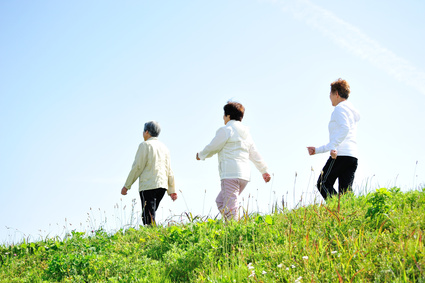When it comes to health, food is usually the main topic of discussion. However, there is another key factor to optimal health: exercise.
Daily exercise is a very important when it pertains to brain function and mood lifting.
Many people don’t exercise because they are not sure what exercises they should be doing, or which training program to follow.
New research shows that the specific exercises don’t matter, but it is more important to just get up and get moving. This was the finding of a study conducted at the Institut universitaire de gériatrie de Montréal (IUGM), an institution affiliated with Université de Montréal, by Dr. Nicolas Berryman, PhD, Exercise Physiologist, under the supervision of Dr. Louis Bherer, PhD, and Dr. Laurent Bosquet, PhD, that was published in the journal AGE (American Aging Association) in October.
The research compared the effects of different exercise methods on the brain function of people from ages 62 to 84 years old. Two groups were given high-intensity aerobic and strength-training programs, while the third group was given gross motor activities (coordination, balance, ball games, locomotive tasks, and flexibility). While the aerobics and strength-training groups showed improved physical fitness, all three groups showed an improvement in brain function.
The subjects in the third group performed exercises that can easily be done in the comfort of your own home.
“Our study targeted executive functions, or the functions that allow us to continue reacting effectively to a changing environment. We use these functions to plan, organize, develop strategies, pay attention to and remember details, and manage time and space,” explained Dr. Louis Bherer, PhD.
“For a long time, it was believed that only aerobic exercise could improve executive functions. More recently, science has shown that strength-training also leads to positive results. Our new findings suggest that structured activities that aim to improve gross motor skills can also improve executive functions, which decline as we age. I would like seniors to remember that they have the power to improve their physical and cognitive health at any age and that they have many avenues to reach this goal,” concluded Dr. Nicolas Berryman, PhD.
Note: None of the information in our website is intended to diagnose, treat, cure or prevent any illness or disease. The content on our website is for educational purposes only.
DON’T FORGET to sign up for our weekly newsletter to get our latest articles, updates, free recipes and giveaways.
For how exercise can be a memory saver.
Can exercise add years to your life?
How to exercise and enjoy the outdoors if you are an allergy sufferer.
For easy daily foot and leg workouts.
Best exercises to do when you are too tired to exercise.
REFERENCES:
1. ““Multiple Roads Lead to Rome” To Reap the Brain Benefits of Physical Activity, Just Get Moving!” Nouvelles.umontreal.ca. UdeMNouvelles Université De Montréal, 29 Oct. 2014. Web. 03 Nov. 2014.
2. “Multiple Roads Lead to Rome: Combined High-intensity Aerobic and Strength Training vs. Gross Motor Activities Leads to Equivalent Improvement in Executive Functions in a Cohort of Healthy Older Adults.” Springer Link. AGE, 01 Sept. 2014. Web. 03 Nov. 2014.

















